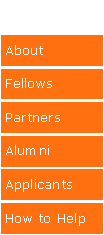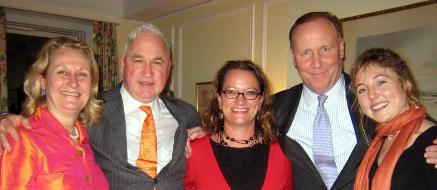
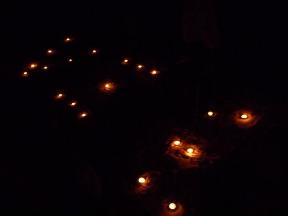
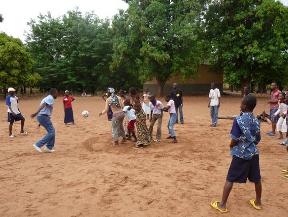
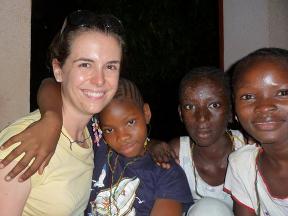
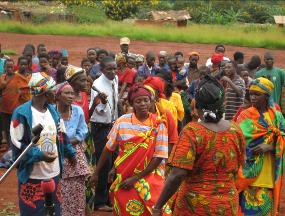
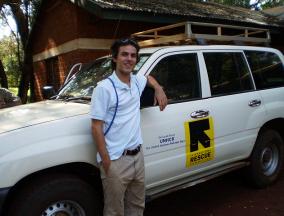
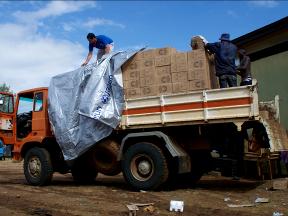
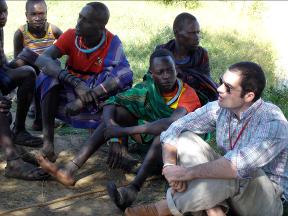


|
Fellows’ Flyer |
|
April 2009 |
|
News and views for and by Princeton in Africa Fellows |
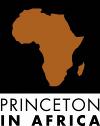

|
In this Issue: |
|
Highlights from 2008-2009 Fellows Stuart Campo in Uganda; Tim Callahan in Tanzania; and Hahna Fridirici in Burkina Faso |

|
The Karamoja sub-region of northeastern Uganda, inhabited primarily by nomadic pastoralists, is the country’s most neglected region. Insecurity caused by internal and external cattle raiding has perpetuated extreme poverty, famine, and a host of other severe health and development challenges in the region. Traditions of forced sex at courtship, wife inheritance, and—more recently—rape and open abuse of women and girls make the risk of HIV/AIDS particularly acute. Coupled with pervasive negative attitudes towards formal education, these traditions limit enrolment and perpetuate low literacy rates, undermining access to health and development information critical to fostering a healthy, informed, and empowered Karimojong population.
This complex situation has made many development agencies averse to working in the region. Fortunately for me, Straight Talk Foundation (STF)—the Ugandan Health & Development Communication NGO with which my fellowship is based—has run a full-scale program in Karamoja since 2006. With support from UNICEF, STF implements a holistic package of interventions aiming to increase access to health & development information and sustain dialogue at the community level to facilitate social change. The package includes local language radio shows, targeted informational print campaigns, and face-to-face outreach, training, and counseling, all of which are situated within the unique traditions, beliefs and risks that define the Karimojong context. As the Grants & Special Projects Manager at STF, I oversee the implementation of this package—an incredible opportunity that has challenged my preconceptions, forced me outside of my comfort zone, and made me reassess my priorities and interests vis-à-vis development.
Before my first trip to Karamoja, I managed the STF program there with what I now recognize as incredible hubris. At my first meeting with UNICEF to discuss the project, I faced extreme frustration with STF for missing activity deadlines, particularly the distribution of 5,000 solar-powered radio sets—an effort slated for early 2008 and essential to the success of the project, but still inchoate six months into the project. With two weeks on the job, no first-hand experience in Karamoja, and naïve deference to the UN, I left the meeting as frustrated with STF as my UNICEF counterpart. I immediately called my field coordinator in Karamoja with a battery of questions about missed deadlines and delayed activities, only to grow more frustrated with what I believed at the time to be excuses and not explanations. I found myself indignantly wondering how difficult it could be to distribute 5,000 radios in a region with no infrastructure, terrible roads, extreme insecurity, and very little in the way of mapping needed to facilitate a strategic distribution effort. Then I took a step back, realized how irrational I was being, and planned a trip to Karamoja the following week to get the project back on track.
Between early September and mid-October, I made three trips to Karamoja. I realized swiftly upon arriving how naïve my expectations of streamlined implementation had been—and how much support was necessary in terms of planning, strategic thinking, and negotiation with partners if our project deliverables were to be met. Even more important, I realized how deeply complex the challenges of working in the region, which my program coordinator raised the week before, truly are: explanations, not excuses. Seeing this, I was able to speak deliberately with my team, determine what support they needed, and devise a distribution strategy that harnessed local knowledge and utilized resources and partnerships that I never would have considered necessary nor viable sitting at my desk in Kampala without seeing the situation on-the-ground. Working with an energetic cadre of Karimojong volunteers, my team and I executed this accelerated distribution effort in early October, distributing over 4,000 radios across five districts in a two week period. In addition to every school, health facility, and community-based organization in the region, roughly 3,500 manyatas—semi-permanent homesteads that comprise Karimojong communities—received radios as a result of this effort.
The potential impact of these radios, the accompanying STF programs, and the opportunities they represent is tremendous. As one elderly gentleman said after his community received a radio, “The man who created this thing must have been a very good man, for he wanted to bring knowledge to the people of Karamoja.” I’ve become a part of this effort to bring knowledge to the Karimojong. Equally important, I now recognize the incredible opportunity I’ve been given in my role at STF, both with Karamoja and my other projects, to bring a new kind of knowledge to myself—knowledge that has and will continue to inform my future decisions and change my life in invaluable ways. |
|
by Stuart Campo, ’08-’09 Fellow at Straight Talk Foundation in Uganda |
|
Notes from the Field |
|
Stuart sitting in on a discussion of health and development issues with a group of young pastoral warriors in Uganda’s rural Moroto District |
|
Stuart loading a lorry for accelerated radio distribution in Moroto District, part of Karamoja |
|
Karimojong children playing a traditional game while listening to STF radio set in Moroto District |

|
Tim with one of the 4-wheel drive vehicles he and IRC rely on to get around western Tanzania |
|
by Tim Callahan, ‘08-’09 Fellow at International Rescue Committee in Tanzania |
|
Notes from the Field |
|
Refugees boarding a convoy truck that will take them from the refugee camp back home to Burundi |
|
I am spending this year in western Tanzania working for the International Rescue Committee (IRC). We focus on providing programs and services to a population of 40,000+ Burundian refugees located in the area, most of who arrived over a decade ago after ethnic tensions at home boiled over into violence, much the same as occurred in neighboring Rwanda.
My principal duties with IRC include writing, compiling, and editing reports to donors like the U.S. State Department and United Nations High Commissioner for Refugees, and then appealing to them and others later for new rounds of funding through grant proposals. Despite spending most of my time in an office, frequent donor reports and grant proposals, field reports from program managers, budget preparations, and periodic trips to the refugee camp have provided me with a good look at IRC’s operations in Tanzania, as well as the common threads of all humanitarian work abroad.
My home for the year, Kasulu Town, is located near the refugee camp in the far western Kigoma Region of Tanzania. We are a thin (and deep!) Lake Tanganyika away from Democratic Republic of the Congo and less than a two-hour drive from the border of Burundi. Living out here has given me a new perspective on the word ‘remote.’ Last year I lived and worked as a boarding school teacher in what I considered at the time to be the boonies. My opinion has since changed. There is essentially one road to get to my new hometown, and it is a dirt road riddled with potholes and bumps from years of heavy use by the refugee and humanitarian community. Unlike in much of the developed world, SUVs serve a real purpose here. Kigoma Region is one of the few regions in Tanzania (if not the only one) that still lacks grid electricity. Fortunately for me, IRC provides electricity and internet for the entire workday through generators, and electricity for my guest house for a majority of the off hours. Most of the local Tanzanian population, on the other hand, lives without that luxury. They spend their days in the field or a local duka (mini-grocery store), and their evenings in candlelight.
Adapting to my new work and living environments this year has been both challenging and rewarding. Due to my naivety and hunger for knowledge upon arrival in Tanzania, my learning curve has been a steep one. I approached my new life last August with little or no knowledge about the surroundings I would inhabit, the lifestyle I would soon adopt, the language I would at least attempt to learn, the culture of Kigoma Region and Tanzania, refugee situations, and the humanitarian world of Africa. Minus the language comprehension, I have learned and adjusted, and the result has been a fun and personally and professionally rewarding experience. |

|
Celebrating International Women’s Day in the refugee camp |
|
Happy Birthday |
|
April 7 Hilary Robinson |



|
Class of ‘72 Promotes PiAf
The Class of 1972 invited Princeton in Africa to share its story at a gathering hosted by Jim and Christine Robinson, parents of PiAf alum Hilary Robinson ‘07. Pictured below: Christine Robinson, PiAf President George Hritz ‘69, PiAf Executive Director Cordelia Persen, Jim Robinson ‘72, and PiAf alum and board member Emily Holland ‘01. |
|
Other Upcoming Events…
New Fellows’ Orientation May 15-16
PiAf Alumni Gathering and Open House May 30, Post P-Rade-6:00 PM in the NEW PiAf office (194 Nassau Street, Suite 219) Princeton in Africa alumni and friends are invited to catch up with one another and the program. PiAf staff will share highlights and recently returned Fellows will be present to discuss their experiences.
New Fellows’ Reception June 1, 2:00-4:00 PM, 194 Nassau Street, Suite 219 A special Class Day reception for 2009-2010 Fellows and their families. Please join us as we send off our newest class of Fellows! |
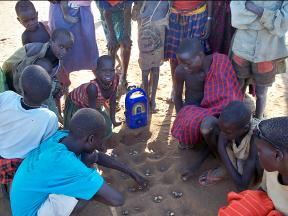
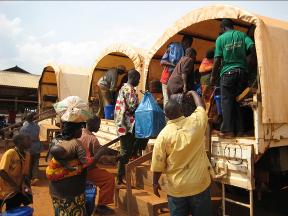

|
About a month ago, I was planning Burkina Faso’s first ever “Teen Camp.” Teen Camps are retreats for adolescent patients of BIPAI (Baylor International Pediatric AIDS Initiative) Centers of Excellence. For us here in Burkina, hosting our own Teen Camp presented a huge coming of age step for our young clinic. Currently, the clinic is in its third year of operating out of the public hospital here in Bobo-Dioulasso with minimal staff, setting it apart from other BIPAI projects that have their own facilities.
We were steadily moving forward with plans for an Easter Break “sortie” (or retreat) 4 weeks ago. I asked a few folks, “This Easter Break—is it around Easter?” “Oh yes,” they replied. I pulled out my calendar. “So is it before Easter, after Easter… ?” I asked. “Umm, after,” they said. Ok, good. A date was fixed for a couple days after Easter. As I make rounds around town with our various community group partners, I tout this sortie during Easter Break: out of town and over night, it will be a real treat for our patients, most of whom have never left Bobo. We have meetings, we discuss, people weigh in and give advice. Progress!
Not until we make a casual stop at a potential location does anyone mention, “Oh, vacation, yes, that starts next week, what day would you like to use our property?” NEXT WEEK? I was stunned—and yet not stunned. So it goes here.
So it came to pass, I had ten days to find funding, harness our administrator who was off in America defending BIPAI-Burkina’s mission, get a schedule set, mobilize our volunteer counseling staff, and round up some eligible kids. Ten days, pas de problème ... ou bien (or no)?
And we did it! Twenty-three teenagers between 12-20 aware of their sero-positive status appeared for the bus with all the permission slips signed ahead of time. A miracle! There were kids I knew from community groups and days spent at the hospital, and kids I had never met—there were even teens that had been lost to follow up for months. A bus appeared, too. And into this sub-mini bus we packed 23 teens—miracle of miracles.
There was a series of miracles, really. In spite of momentarily losing my bus of kids and actually passing 30 seconds mentally planning how to save them from a certain life of slavery on cocoa plantations in Cote D’Ivoire at the hands of child-stealing bus-drivers (a common enough occurrence here)—we all arrived safely just 2 hours late. As we sat down to our first session, I noted the lady counselors had disappeared into the kitchen to “causie” (chat) with the cooks, or so seemed the most logical explanation for their absence. As introductory games moved forward, I am ashamed to admit I had choice internal words for our absentee counselors. As I stomped up to the “kitchen” to “chauf” them (make clear my disappointment), I find them half undressed, sweating buckets over the open fire cooking dinner. It was one of those so-hot-that-typing-at-my-computer-makes-me-drip-sweat-off-my-nose days (yeah hot season!). But these women were laying it out, making up for some truant cooks, so that our teens might eat. They admirably continued to do so throughout the trip sans complaint. All these miracles—for which I am thankful and by which I am humbled.
The series of logistical miracles paved the way for a small miracle between the kids. Between swimming, hiking, and playing games they started talking. At our educational sessions they increasingly posed questions and gave opinions. They clutched each others’ hands screaming and laughing as they went swimming for the first time in their lives. There were impromptu matches of volleyball and football. They teased each other mercilessly, as is only culturally appropriate. They helped one another remember to take their medications. It was a retreat for teens both like and nothing like other retreats I’ve worked on before.
We were all soaking wet from a last-minute dip in the river as we reluctantly packed up to go. Parting ways at the hospital, encouraging comments flew through the air: “See you at support group!” and “ Next time, we’ll come back and do it for a whole month!” As for me, I approach the close of my service here, but my hope and prayer for these kids is that this is just the beginning of a life in community— knowing and being known in friendship. |
|
by Hahna Fridirici, ‘08-’09 Fellow at Bristol-Myers Squibb/Baylor Pediatric AIDS Initiative in Burkina Faso |
|
Notes from the Field |
|
Hahna with some of the girls who participated in Teen Camp. These girls appear younger than they really are because HIV can affect growth and development. |
|
Teen Camp participants played a modified dodge ball game that modelled the immune system under attack by HIV |
|
One night during Camp, each teen was given a candle. Together the group spelled out VIH (French for “HIV”) and then turned it into VIE (French for “Life”). |

